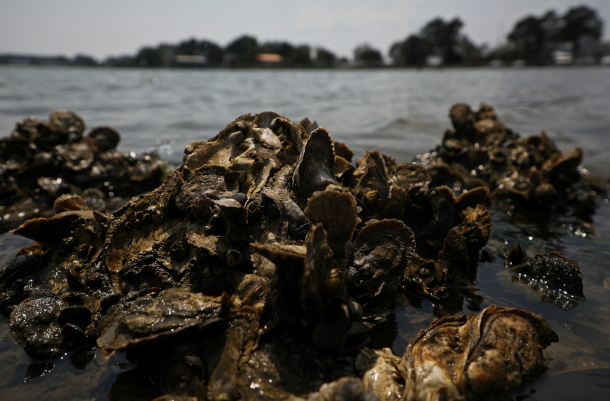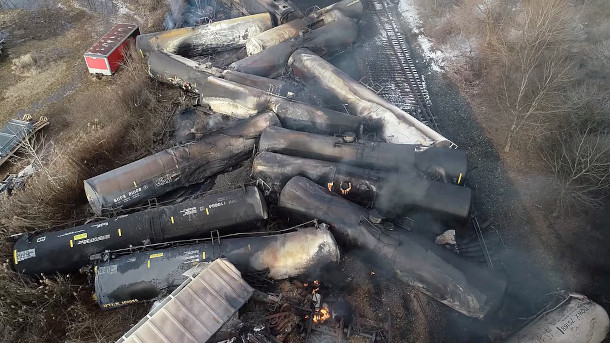Beyond the Headlines
Air Date: Week of January 19, 2024

The Chesapeake Bay oyster fishery is an important source of food and income for many people around the estuary. (Photo: Aileen Devlin, Virginia Sea Grant, Flickr, CC BY 2.0)
Living on Earth Contributor Peter Dykstra joins Host Paloma Beltran with good news of an oyster baby boom in the Chesapeake Bay. Also, the EPA is reviewing the safety of vinyl chloride, which is widely used in everything from water pipes to medical devices but is a carcinogen that can harm livers and neurological systems. And in history, they look back to when John Kerry spoke about climate change at his confirmation hearing as Secretary of State.
Transcript
DOERING: It’s Living on Earth, I’m Jenni Doering.
BELTRAN: And I’m Paloma Beltran.
It's time now for a look beyond the headlines and on the line from Atlanta, Georgia is Living on Earth contributor Peter Dykstra. Hey there Peter, how are you? And what do you have for us today?
DYKSTRA: I'm doing well Paloma. I hope you are too. I'm going to start with a good news story, a potential big recovery that I thought would never happen. Because years ago back in the 1980s, there was an annual Chesapeake Bay Seafood Festival. And at its depths of environmental problems with the bay, there wasn't enough seafood. They had to bring it in from other Atlantic ports. They had to bring it in from the Gulf of Mexico, to have enough oysters and blue crabs to have something to eat at the Seafood Festival. Things were that bad in the bay due to overfishing, pollution; there was a dangerous oyster disease that was making the rounds. But now things are looking up. Oyster recovery efforts, at least in the Maryland part of the bay, seem to be on at least a four year trend of a huge comeback. Maryland's annual Fall oyster survey showed what they call a remarkable number of spat, those a juvenile oysters, showing up through all of the regions of the Chesapeake, and tributaries in the bay everywhere — 86.8 spat per bushel of oysters. That's nearly four times the median number over the last four decades, four years in a row that oysters have shown signs of a comeback.
BELTRAN: Wow. And of course, oysters act like ecosystem engineers building these wreaths that serve as habitats for different animals. And they're also filter feeders. They basically clean water as they feed themselves. So this is encouraging news about efforts to repopulate oysters in the Chesapeake. What else do you have for us?

Drone footage shows the freight train derailment in East Palestine, Ohio, February 6, 2023. The train was carrying vinyl chloride, a chemical classified as a human carcinogen. Vinyl chloride is amongst the five chemicals the EPA will evaluate under the Toxic Substances Control Act. (Photo: National Transportation Safety Board, public domain)
DYKSTRA: EPA has begun a review of vinyl chloride. Polyvinyl chloride is a very familiar plastic used in a lot of different contexts. It could eventually potentially lead to serious restrictions, or even a ban. EPA is reviewing vinyl chloride under the Toxic Substances Control Act. That could bring about some health protections since polyvinyl chloride is listed as a carcinogen. It can cause liver disease, neurological problems; it's been known to cause miscarriages. And they're still produced in the billions of pounds each year in the US.
BELTRAN: Isn't PVC one of the chemicals that burned in that train derailment that happened in East Palestine, Ohio?
DYKSTRA: It is. And polyvinyl chloride is also a primary substance used for pipes. And it has been looked to as one of the primary replacements for lead water pipes that have caused problems in Flint, Michigan, and many other urban environments around the country. So there may be some changes in store for how we deal with this other huge health problem of lead water pipes.
BELTRAN: Well, we'll definitely have to follow up on what comes out from this chemical review by the EPA. What do you have for us today from the history books Peter?

John Kerry has announced that he would step down as the United States’ first Special Presidential Envoy for Climate and join Joe Biden’s presidential reelection campaign. (Photo: United States Department of State, Wikimedia Commons, Public Domain)
DYKSTRA: Eleven years ago, January 24, 2013, John Kerry had a friendly confirmation as Secretary of State, replacing Hillary Clinton. He called climate change a life-threatening issue. It helped assure that the Obama administration would have an increased focus on climate.
BELTRAN: Yeah, and John Kerry recently announced that he will be leaving his post as special climate envoy by the end of this year, and he will be joining President Biden's reelection campaign, along with Al Gore.
DYKSTRA: Two of the biggest voices back in their Senate days on addressing climate change are now going to be doing so for the Biden Harris reelection effort. And let's see where it goes from there.
BELTRAN: Well, thank you for bringing us these stories, Peter. Peter Dykstra is a Living on Earth contributor, and we'll talk to you again real soon.
DYKSTRA: Okay, thanks a lot, Paloma. Talk to you soon.
BELTRAN: And there's more on the stories on the Living on Earth website. That's loe.org.
Links
The Washington Post | “Maryland Hails ‘Remarkable’ Year for Young Oysters in the Chesapeake Bay”
Learn more about the EPA’s review announcement of Polyvinyl Chloride
San Diego Union Tribune | “Kerry: Climate Change a ’Life-Threatening Issue”
Reuters | “US Climate Envoy John Kerry to Leave Biden Administration”
Living on Earth wants to hear from you!
Living on Earth
62 Calef Highway, Suite 212
Lee, NH 03861
Telephone: 617-287-4121
E-mail: comments@loe.org
Newsletter [Click here]
Donate to Living on Earth!
Living on Earth is an independent media program and relies entirely on contributions from listeners and institutions supporting public service. Please donate now to preserve an independent environmental voice.
NewsletterLiving on Earth offers a weekly delivery of the show's rundown to your mailbox. Sign up for our newsletter today!
 Sailors For The Sea: Be the change you want to sea.
Sailors For The Sea: Be the change you want to sea.
 The Grantham Foundation for the Protection of the Environment: Committed to protecting and improving the health of the global environment.
The Grantham Foundation for the Protection of the Environment: Committed to protecting and improving the health of the global environment.
 Contribute to Living on Earth and receive, as our gift to you, an archival print of one of Mark Seth Lender's extraordinary wildlife photographs. Follow the link to see Mark's current collection of photographs.
Contribute to Living on Earth and receive, as our gift to you, an archival print of one of Mark Seth Lender's extraordinary wildlife photographs. Follow the link to see Mark's current collection of photographs.
 Buy a signed copy of Mark Seth Lender's book Smeagull the Seagull & support Living on Earth
Buy a signed copy of Mark Seth Lender's book Smeagull the Seagull & support Living on Earth

